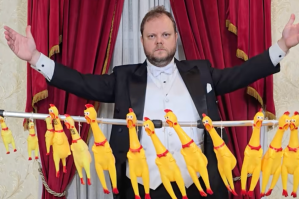Christmas is just a couple short weeks away, and there’s no better time to think about Santa’s physics-defying ride around the globe.
7 billion people, 10,000 homes per second, and just 48 hours (thank you, time zones!) to do it? It’s not a job for just anyone. Clearly you have to have some major skills to pull it off.
But — does Santa have to be a man?
GIF from “Rudolph, the Red-Nosed Reindeer.”
Anomaly, which is a creative agency behind the #MoreWomen campaign, set out to find out how integral Santa’s gender is to the job of being Santa.
In the video, a group of kids is asked if a woman could do Santa’s job.
And they want you to try this at home! GIFs via Anomaly.
The answers were kind of, well, disturbing.
It’s not so much the whole “Santa has to be a man” aspect that’s disturbing, but more the reasons why a female Santa just wouldn’t work that raised some eyebrows.
That’s exactly the point the video is trying to make.
Many of the kids’ reasons why Santa couldn’t be a woman centered around stereotypes.
There’s the bad driver …
… the mom …
… the migraine-prone …
… and the weak.
The video encourages parents to use the question about Santa as a way to talk to their kids about stereotypes.
Studies show that gender-based stereotypes (such as “women are weak” or “men are good drivers” or — well, you get the idea) are often learned at home and at a young age.
Which is neither to say that the kids nor their parents are anything other than lovely human beings. They probably are!
“Subtle gender differences between how mothers and fathers act could be imparting important lessons to children about what it means to be male and female.” — Clara Moskowitz, LiveScience
But when parents’ subconsciously model of their own parenting style off of those same gender roles, kids pick up on that.
Here’s how Clara Moskowitz at LiveScience describes one study:
“Fathers issued more imperatives (such as ‘Put the toy in the bag’) and polite commands (‘Why don’t you try pushing that’) than mothers, while mothers gave more play leads, such as ‘Wanna look at the book?’ or ‘Let’s see what’s in this bag.
***
Ultimately, these subtle gender differences between how mothers and fathers act could be imparting important lessons to children about what it means to be male and female. The kids might pick up on the fact that daddies are more assertive and mommies are more passive and incorporate that into their own behavior over time.”
Great Christmas movie or greatest Christmas movie? GIF from “Jingle All the Way.”
And the same thing goes for what kids see in the media.
If the only behavior kids of all genders see as a representation of girls and women in movies and TV shows are them shopping, playing with dolls, and doing other traditionally feminine things, that’s going to have a lasting effect on their whole concept of what girls are like.
Not that there’s anything wrong with enjoying shopping. GIF from “Mean Girls.”
Talking to your kids about stereotypes is just one way to help them unlearn them.
Unlearning stereotypes doesn’t have to be hard. Really, it’s as simple as making sure kids know that there are people who exist outside of them.
Show your kids sports heroes like Serena Williams, who shows that women don’t have to be weak; comic strips that show that, yes, men can be emotional (and it’s OK); videos that demonstrate how odd some of society’s gender-based double standards are; or even just the fact that some people exist outside the gender binary.
The path to unlearning some of those stereotypes can begin with asking kids a question like “Could a woman do Santa’s job?”
The key is to get young minds thinking about the world, questioning the limitations and stereotypes in place (another example: “Why is it always that a princess needs saving by a man? Why never a prince being saved by a woman?”) and understanding that there are no limits to what they can do in life.
“Whoa, whoa, whoa, guys. Who says you can just ‘win’ me?” GIF from “The Princess Bride.”
All of this is a part of why it’s important to have diverse representation in media.
When kids are little, they’re sponges for the world around them. And if all they see are very narrow depictions of what boys are “supposed” to be like and what girls are “supposed” to be like, they’ll wind up trapping themselves in those boxes.
By starting this conversation, you’re helping them process the amazing potential that is life!


































